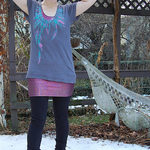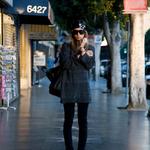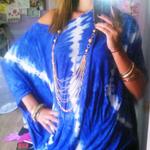- Related topics: Below you will find more in depth information on this topic...
-
A Complete Breakdown of Nigerian Clothing
-
African Clothing: What do the colors mean?
-
Black Panther Movie - Clothing of Wakanda
-
What exactly is a Dashiki?
Share Your Style
Style Icons
What exactly is a Dashiki?
A loose, brightly colored shirt or tunic, originally from West AfricaDashiki is basically a top or collarless t-shirt but not in the stringent western sense. It is an African garment, usually quite colorful and loosely fitted. Dashikis also have distinct patterns, at times embroidery such as intricate threadwork or accessories such as beads. Dashiki originated in West Africa, notably Nigeria, Ghana and Mali among other nations. It became popular in the United States through the sixties, at the time of the Civil Rights Movement. Back then, wearing a dashiki was a sign of protest, an assertion of African culture and it symbolized empowerment and equal rights for blacks. Today, dashikis are more of a style statement. Beyond fashion and civil rights as well as social and cultural significance, dashikis are extremely comfortable. They are as convenient to wear as they are colorful and stylish.
The Origin of Dashiki
Dashiki is derived from the word "dan ciki". The Hausa word means shirt. Dashiki is worn by men and women. The garment covers the upper half of the body. It can stretch all the way down to the hips or be cropped at the waist. It may have a slim fit but traditionally it has been slightly oversized. This is in sharp contrast with the western shirt or t-shirt, which is usually well fitted. Shirts were traditionally tucked in by men and women across Europe and North America. A dashiki is not tucked in. It hangs loosely over the trouser or jeans. Dashikis can have a round collar or a v shaped neckline. It can be a low neck design or the collarless round rim can be as high as the base of the neck. The primary purpose of the dashiki was to cover the upper half of the body but in a comfortable way. This is why large round necks and oversized fitting were customary.
Dashikis have always been very colorful. They can be monochromatic today but traditionally a myriad of colors have been used. Most dashikis will have patterns and a mishmash of over half a dozen colors. The patterns are usually concentrated on the part of the garment covering the chest, at the sleeves and also at the helm. It is not uncommon to find dashikis with patterns all over or with no patterns. Dashiki is not a formalwear. It can be classified as a semiformal garment but it is actually casual apparel. In West Africa, dashikis have been an all-weather and all-purpose friend. They are worn socially and at special occasions. They are worn at workplaces and at home.
Suitable Pairings with DashikiTraditionally, a dashiki has been worn with pants and topped with brimless caps, also known as kufi. Dashikis can be mass produced draped clothing or they can be completely tailored. Today, dashikis are worn with denims or jeans, casual pants, shorts, cargo trousers and others. Women can wear dashikis with skirts, jeans, leggings and shorts. Owing to the colorful aesthetics of dashikis, they cannot be paired with conventional headgear and accessories of the west. Belts, hats and other common accessories don't blend well with a dashiki. Dashiki is itself a style statement.
Pop Culture Reference and Significance of Dashiki
The significance of dashiki is at its peak during Black History Month and Kwanzaa. For all practical purposes, a dashiki is a worthwhile consideration. There is no dearth of clothes that are comfortable almost anywhere you are but dashikis can be truly convenient during spring, summer and early fall. Dashikis are particularly helpful for hot and tropical regions. The garment is quite airy, allowing the skin to breathe and if the right material is chosen, then dashikis can also absorb sufficient sweat or moisture. The garment is lightweight, it is freer as there is no need to tuck it in and it is vibrant enough to not look bland. The palette played a significant role in the sixties when western wear, formals or casuals, was mostly monochromatic and lacked a myriad of hues as well as patterns.
Dashikis first featured in movies, notably Uptight in 1968 and then Putney Swope in 1969. Soul Train, a weekly television show in 1971, featured dashikis. Various African American celebrities of the time donned dashikis at talk shows and other public events. Some of them were Jim Brown, Bill Russell, Wilt Chamberlain and Sammy Davis Junior. The hippie culture endorsed dashikis completely as it became an integral part of the counterculture. Over the years, the traditional West African garment has been popularized by Beyonce and Rihanna among others.
Where can you buy a Dashiki?
DashikiPride.com offers various garments for men, women and children. It was started by three sisters; Mirian Chinyere Ugokwe, MarySonia Chizoba Ugokwe, and Lilian Chioma Ugokwe. Aged 20 and 21 year old (Mirian and Lilian are twins), these three siblings were born and raised in Aba, Nigeria.
You can also find authentic, handmade, 100% cotton West African Attire at DashikiDresses.com. Most of their products are intricately made by hands, a single order can take between 1-2 weeks OR 7-14 days to complete. However they also carry some ready-to-order products.
Be the first to comment
Other Topics
 When did Guys wearing Skinny Jeans become Acceptable?Not too long ago, skinny jeans were completely rejected by men, including fashion designers. Even today, skinny jeans are not generally approved of or...Read the rest of this fashion article.
When did Guys wearing Skinny Jeans become Acceptable?Not too long ago, skinny jeans were completely rejected by men, including fashion designers. Even today, skinny jeans are not generally approved of or...Read the rest of this fashion article. How Much Cleavage Is Too MuchBelieve it or not but breasts have etiquette's attached to them and in life, it is important for a woman to understand the whole concept of how much c...Read the rest of this fashion article.
How Much Cleavage Is Too MuchBelieve it or not but breasts have etiquette's attached to them and in life, it is important for a woman to understand the whole concept of how much c...Read the rest of this fashion article. Kylie Jenner A Fashion Mogul?Kylie Jenner is a fashion icon. There is no debating that. Whether or not she is a fashion mogul is yet to be ascertained. The American model and entr...Read the rest of this fashion article.
Kylie Jenner A Fashion Mogul?Kylie Jenner is a fashion icon. There is no debating that. Whether or not she is a fashion mogul is yet to be ascertained. The American model and entr...Read the rest of this fashion article. Should Your Boyfriend Like the Way You Dress?Lets face it, what girl doesn't like to dress good and look sexy from time to time. You occasionally like to dress in that low-cut top, short dress or...Read the rest of this fashion article.
Should Your Boyfriend Like the Way You Dress?Lets face it, what girl doesn't like to dress good and look sexy from time to time. You occasionally like to dress in that low-cut top, short dress or...Read the rest of this fashion article. Why Sharing Your Clothes Is Not A Good IdeaMost people at one time or another has loaned a sibling, friend or a roommate an article of clothing from their wardrobe. In some cases, siblings or r...Read the rest of this fashion article.
Why Sharing Your Clothes Is Not A Good IdeaMost people at one time or another has loaned a sibling, friend or a roommate an article of clothing from their wardrobe. In some cases, siblings or r...Read the rest of this fashion article. Fitting Room EtiquetteFitting rooms, or as I call them, The AA Room (Addicts Anonymous Room, I will explain later) in clothing stores are not a requirement but are favorabl...Read the rest of this fashion article.
Fitting Room EtiquetteFitting rooms, or as I call them, The AA Room (Addicts Anonymous Room, I will explain later) in clothing stores are not a requirement but are favorabl...Read the rest of this fashion article. Ashley Benson's Fashion Sense
Ashley Benson is an up and coming actress from the popular ABC television series pretty little liars. Ashley Benson plays Anna Marin a popular 'it...Read the rest of this fashion article.
Ashley Benson's Fashion Sense
Ashley Benson is an up and coming actress from the popular ABC television series pretty little liars. Ashley Benson plays Anna Marin a popular 'it...Read the rest of this fashion article. Everything you need to know about Big Baller BrandBig Baller Brand, trademarked as BBB, is an apparel and footwear company based at Chino Hills, California in the United States. The private company wa...Read the rest of this fashion article.
Everything you need to know about Big Baller BrandBig Baller Brand, trademarked as BBB, is an apparel and footwear company based at Chino Hills, California in the United States. The private company wa...Read the rest of this fashion article. How to Dress Like a RockstarDo you know how to dress like a rockstar? Well to dress like a rockstar you need to have lots of funky fashion. Don't be afraid to express yourself. e...Read the rest of this fashion article.
How to Dress Like a RockstarDo you know how to dress like a rockstar? Well to dress like a rockstar you need to have lots of funky fashion. Don't be afraid to express yourself. e...Read the rest of this fashion article.



















